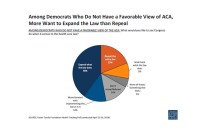Latest KFF Health News Stories
For Every Mile They’ll Save $100: Study Finds Health Care Costs Vary Widely Even Within Same State
A knee replacement in Riverside, Calif., is about $27,000 less expensive than it is in Sacramento. And that’s just one example of the wide discrepancies analysts found when they looked at costs across the country.
GlaxoSmithKline Reports Rise In Earnings Driven By Vaccine, Health Product Sales
The British drugmaker has also found that ending doctor payments did not undermine drug sales. Meanwhile, Sanofi bids $9.3 billion for cancer biotech Medivation and Vertex’s cystic fibrosis drug sees mixed results.
Pfizer Agrees To Pay $785 Million To Settle Medicaid Drug Discount Case
The suit grew out of allegations that Wyeth, which Pfizer acquired, had hidden from Medicaid officials the discounts that it was giving hospitals on ulcer drugs.
CMS Unveils Proposed Medicare Rule To Reward Or Penalize Physicians Based On Quality Of Care
The new physician payment system was unveiled Wednesday — a year after Congress approved the so-called “doc fix” bill.
Ryan Calls For End To Health Law’s Premium-Cost Protections For People Who Are Ill
House Speaker Paul Ryan, R-Wis., says the provisions that keep insurers from charging sick people higher rates has raised costs for healthy consumers while undermining choice and competition, Reuters reports. Also in health law news are stories on expected premium increases and insurer Anthem’s latest earnings report.
Wyden Introduces Bill Aimed At Protecting Seniors From High Drug Costs
The legislation, proposed by Sen. Ron Wyden, D-Ore., would make sure Medicare recipients don’t face out-of-pocket costs past a cap of about $7,500.
Valeant Officials, Blasted By Lawmakers For ‘Immoral’ Pricing Practices, Admit To Making Mistakes
“Pigs get fed, hogs get slaughtered. It’s time to slaughter some hogs,” Sen. Claire McCaskill said in opening the committee hearing on high drug prices. Valeant’s outgoing CEO J. Michael Pearson offered his regrets to a skeptical panel, while investor Bill Ackman promised a shift in pricing strategy going forward.
Today’s early morning highlights from the major news organizations.
Democrats Increasingly Want Expansion Of Health Law, Poll Finds
A survey by the Kaiser Family Foundation finds a majority of Democrats think the law doesn’t go far enough.
Counterfeit Opioid Poisonings Spread To Bay Area
Vomiting, breathing problems, lethargy, unconsciousness result from pirate pills laced with fentanyl.
Outgoing Valeant CEO Tells Senators That Drug Price Boost Was ‘A Mistake’
Appearing before the Senate Special Committee on Aging, J. Michael Pearson tells lawmakers that he regrets significantly raising the price of certain drugs. Also testifying are Valeant investor and board member William Ackman and former CFO Howard Schiller.
Viewpoints: Zika Virus Raises Questions About Pandemic Readiness; Cheers And Jeers For Obamacare
A selection of opinions on health care from around the country.
Perspectives On Drug Prices: Neediest Patients Aren’t Seeing Benefits From Rebates
A selection of opinions on drug costs from around the country.
Even Amidst Outcry Against Costs, Pharmaceutical Companies Are Still Hiking Prices
News outlets from across the country report on the pharmaceutical drug industry.
Outgoing Valeant CEO To Issue Mea Culpa For ‘Mistake’ Of Aggressively Boosting Drug Prices
At a Senate Committee on Aging, J. Michael Pearson will testify that he regrets pursuing transactions just to increase the price of the drugs.
News outlets report on health issues in New York, California, Massachusetts, Hawaii, New York, Tennessee, Georgia, Connecticut and Missouri.
N.M. Plans To Cut $33.5M In Medicaid Reimbursements To Doctors, Hospitals, Dentists
The cuts are part of an effort to close an $86 million state funding gap. Also in the news, a look at funding problems for California’s Medicaid program for patients with HIV.
Despite Initiatives Targeting Childhood Obesity, Researchers See No Downward Trend In Rates
The numbers have remained steady for childhood obesity, but the rate of teens with morbid obesity has increased. The lead researcher, Asheley Skinner of the Duke Clinical Research Institute, says she doesn’t know what the trend would look like without the numerous public health campaigns and White House efforts directed at the epidemic, but “we’re certainly not seeing a reversal.”
‘You’re Going To Have Deaths’: Opioid 10,000 Times More Potent Than Morphine May Be Next Big Threat
The powerful synthetic drug W-18 is slowly seeping into North America, and there are currently no tests to detect it in a person’s system, making it difficult for doctors to help someone who is overdosing. Meanwhile, in California, the 14th fentanyl-related death is confirmed in a recent outbreak of overdoses, and in New England, there’s a growing movement to treat painkiller addiction with marijuana.
U.S. Makes Progress On Health Emergency Preparedness, But Gaps Remain
The Robert Wood Johnson Foundation released a report that uses such measures as vaccination rates and number of hospitals to reflect “the most comprehensive picture of health security preparedness available.” Media outlets report on the results from individual states.




